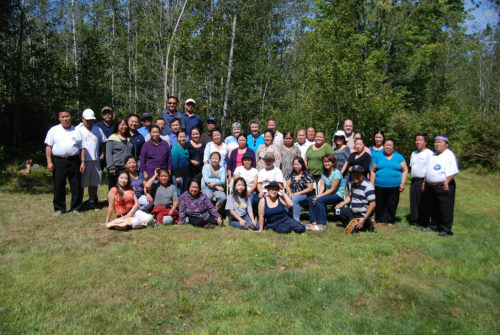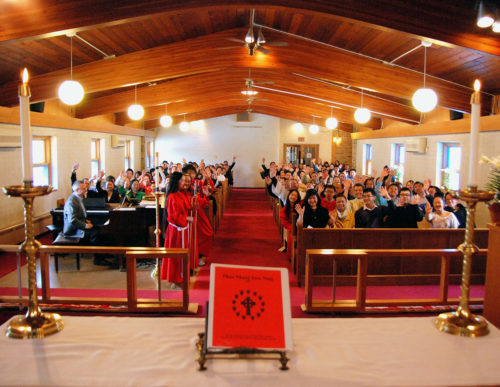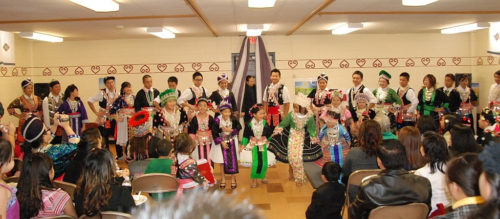Immigrants continue to breathe life into St. Paul churchPartner parish to co-sponsor a refugee familyPosted Jun 20, 2016 |
|

Holy Apostles Episcopal Church is home to a diverse congregation that includes a strong Hmong faith community. Photo: Holy Apostles
[Episcopal News Service – St. Paul, Minnesota] When you walk into Holy Apostles Episcopal Church here on any given Sunday you will find a melting pot. A young female Hmong deacon in her 30s will be hugging a white congregant in his 80s, and youth of many races and ages will be sitting together listening to the Word.
This blend is especially evident in the summer when the congregation celebrates Holy Eucharist with a mixture of both English and Hmong during their combined 10 a.m. service.
Yet, this blended body of Christ that works to love and live together in the world as one, hasn’t always been as diverse as they now are.
In 2004, the church had been in decline for a few years and was facing the reality of having to close, said Rev. Letha Wilson-Barnard, Holy Apostles’ vicar. At the time, Susan Moss, a missionary in the diocese learned from a Hmong friend that a group of 75 Hmong families had left the Roman Catholic church and were without a place to worship. Moss extended an invitation to visit Holy Apostles and over six months the families visited and elders met with the bishop and the vicar to discern if the church could be their new faith home.
“By Easter Sunday 2005, the pews were full and this became the first Hmong majority Episcopal Church in the Anglican Communion,” said Wilson-Barnard. “It has brought life into this congregation.”
The Hmong originally came to the United States in the 1970s from the northern mountain regions of Laos after the end of the Vietnam War. Hmong villagers assisted the CIA in their fight against the North Vietnamese during the war in what has been called a “secret war” in Laos. After the war Hmong were targeted for their assistance of U.S. forces, and like the Iraqis who assisted the United States during the Iraq War, many became refugees. By the year 2000, Hmong immigrants in the United States numbered around 170,000, according to U.S. Census data; Minnesota is home to one of the largest Hmong groups in the country.
The elder Hmong who made Holy Apostles their faith home were first-generation refugees; moreover, there are examples of immigrants revitalizing parishes and communities throughout the Episcopal Church.
“The beautiful thing about this work is how often it is that we as Americans and our congregations are transformed and forever changed by our interaction with our new American neighbors,” said Allison Duvall, Episcopal Migration Ministries‘ manager for church relations and engagement. Episcopal Migration Ministries is one of nine refugee resettlement agencies working with the U.S. Department of State to resettle refugees nationwide.
“Examples are abundant, but one of my favorites is from St. Peter’s Episcopal Church in Louisville, Kentucky, which has experienced a revitalization as it has welcomed Burmese refugees, who were Anglicans before coming to the U.S., into its congregation,” she said. “From an aging congregation with declining attendance, St. Peter’s is now brimming with life – young families, youth acolytes, all the hustle and bustle of a vibrant congregation. Not only that, but now the members of St. Peter’s have had their hearts and minds opened in a deeply personal, relational way to the struggles and joys of refugee and new immigrant life in the United States.”

Holy Apostles Episcopal Church is home to a diverse congregation that includes a strong Hmong faith community; its sanctuary is pictured here on a typical Sunday during a Hmong service. Photo: Holy Apostles
For Bao Moua, a second-generation Hmong, the Episcopal Church had an attractive ethos for the those coming from the Roman Catholic Church because it was similar enough to Catholicism that they felt comfortable with the transition, and the elders who did speak English had a smaller learning curve. It also offered a place where men priests could get married and women could become ordained.
On Thursday, June 23, Moua will become the first Hmong woman to be ordained a priest in the Episcopal Church, alongside three new male deacons. Initially, she was hesitant to the call, she said, but as elders saw and encouraged the gift in her and she got more involved with leadership in the church, she decided to pursue it as a way to empower and encourage others to discern their call, to “pave a way for others that come after me, men and women, young and old.”
The Rev. Toua Vang was actually the first Hmong congregant to be ordained. When he came back to the church, the congregation had to discern what having this type of leadership meant for the church, said Moua.

Holy Apostles holds numerous Hmong cultural celebrations during the year, including observing Hmong New Year in festive costumes. Photo: Holy Apostles
They started a shared ministry committee because they saw that the Hmong had different needs for weddings, funerals, etc., as well as a language barrier. The shared ministry committee members spoke with the bishop about these needs and how everyone could use their gifts and talents within the church’s leadership.
“First we had 20 people signed up,” said Moua. “Then, after a year, we had 14 and those 14 have stuck with us for a few years now.”
It is important to have Hmong leadership and language alive in the church, said Moua.
“It’s important that our elders have the ability to hear the Word in their own language. It will strengthen their faith and it keeps our culture and language alive within the younger generation. It’s been a gift to have the Episcopal Church allow us to bring in our own culture and make it our own. It’s powerful because people can really grasp it and it allows us to be who we are in the Christian faith.”
At first, she said some were hesitant. They struggled with, “Am I worthy (for leadership)?” because of language barriers or not having the traditional educational path the church required.
“But we saw potential in people,” she said. “As we’ve come together, we see the gifts within each other. Even without the educational background, their faith is strong and they’re willing to share that and learn.”
The shared ministry committee has been learning together for three years. Moua interprets for the committee members.
“I’m proud to see our group grow in faith and not be as afraid to do more. To see that we all have gifts and we should share them, that that is open for all,” she said.
The congregation also worked successfully to translate the Book of Common Prayer into the Hmong language a few years ago.
Wilson-Barnard said that the congregation attracts both Hmong and others who are excited about the intercultural nature of the church. She started her work at the church as a seminarian and has stayed for 10 years.
“I think there’s a real richness to sharing life together – the Body of Christ here is, to me as I minister to this congregation, sort of a taste of heaven, staring around the throne with every tribe and nation. It’s been exciting,” she said.

The Rev. Letha Wilson-Barnard, vicar, presides over a baptism at Holy Apostles. Photo: Holy Apostles
Her advice for other congregations that may be facing a similar situation of decline or have large refugee groups in their communities: “Know your community and really work internally on hospitality and what that means. It means really opening up and being open to the possibility to change and transformation.”
Holy Apostles works closely with their local partner church, St. John the Evangelist Episcopal. The churches have worked together for roughly a decade and share youth groups for confirmation. There’s also a farmers market held in their parking lot on Sundays that includes Hmong selling food and crafts.
They’ve also worked together in other various forms of ministry locally and overseas.
For St. John’s, their work with Holy Apostles, as well as current news and events, has influenced them to enter into a process to co-sponsor a refugee family coming into the country in the coming months.
The deeper discussion about the possibility of co-sponsoring a refugee family came last year as the eyes, ears and hearts of the world turned to Syria, said Rev. Jered Weber-Johnson. “A lot of people were asking what the church was going to do since we were preaching at the time about it,” he said.
“As the question continued to come up, the clergy of St. John’s turned the question back to the congregation, ‘Let’s look and pray together about what we can do,’ ” added Weber-Johnson.
A group formed over six months where congregants serious about doing something came together to pray and discern: What more can they could do besides being socially conscious, voting and focusing on how they lived? St. John’s also has a Bible study group that takes news articles of the day and applies biblical principles to their discussions around it. Together, they formed an ad hoc group discernment group.
“Someone new to the parish who had been heavily involved in refugee ministry in other parishes was willing to hold this space and listen, and share whatever resources he had,” said Weber-Johnson. “He was very steady about not letting the issue fall away.”
That parish member was David Borton. He contacted the Minnesota Council of Churches to find out what co-sponsorship would entail.
Minnesota Council of Churches Refugee Service is an affiliate of Episcopal Migration Ministries. In addition to working with 30 resettlement affiliates in 26 dioceses, providing direct assistance to recent arrivals, Episcopal Migration Ministries offers ways for congregations to engage in refugee resettlement in their communities, it also encourages Episcopalians to join the Episcopal Public Policy Network and advocate for policies that protect the rights of refugees and asylum seekers.
Through group collaboration, a proposal resulted and costs were figured out and they decided it would be a good fit for the church.
“We created a multigenerational group to help us all understand what our call to ‘welcome the stranger’ really means,” he said.
The group – which now includes an English as a Second Language teacher, a refugee-service worker, those good with prayer and finance – met and will continue to meet on Sundays to nail out the practical needs of the family that they now call “the St. John’s newcomers.”
They have a general idea of when the family may come – July – but a concrete day hasn’t been set. “It’s like we’re having a baby,” joked one member of St. John’s discernment group.
They also don’t know what country the family will be coming from, but Ben Walen, director of Minnesota Council of Churches Refugee Services, said the groups coming to Minnesota are largely from Somalia and Karen State in Myanmar. He said that the numbers fluctuate, but the service typically resettles about 450 people each year, with 400 coming last year. Refugee Services asks churches for a four-month commitment to help with needs like furnishing, transportation, bringing food, etc.
“This often means also befriending the family, taking them to local events or showing them the community. It’s going beyond just case management, for those refugee families to feel a connection beyond that, which only really the churches can nurture long term. Giving that family a quicker step into American life – that’s a big value. Also, for the church itself, it helps people to learn about their community and the refugees so they don’t feel like the ‘other.’ ”
Co-sponsorship is one of many models for how churches and individuals can be involved in welcoming refugees, said Duvall, who manages church relations and engagement for Episcopal Migration Ministries.
“The beauty of the model is that it actually introduces you to your new neighbors. It’s not always easy, but Jesus doesn’t call us into easiness and comfort. He calls us into the beautiful – and sometimes painful – mess of life,” she said.
“Co-sponsorship introduces newly arriving families to their first American friends, which gives them some sense of calm and comfort that they’re not alone, they’re not isolated and alienated from their new community. While co-sponsorship only lasts during the first few months of a family’s time in the United States, concluding with a wonderful celebration, the friendships formed can last a lifetime. In this time when there is so much misinformation, anxiety, and fear in our country of people we do not know or do not understand, our call to welcome the stranger and to get to know our neighbors has never been more important.”
For Weber-Johnson, getting involved in refugee work is a vital part of the local church and St. John’s.
“It’s not because we believe we’re the solution to the problem because there are more skilled ministries and government agencies doing the good work of solving problems,” he said. “We engage directly in personal discipleship, having our lives bound up in joining with those in the margins … learning their stories, touching their pain a bit, believing that we have a shared humanity and shared brokenness, and that’s important in Christian discipleship and formation.”
– Ashley Wright is a Minneapolis-based freelance writer. She studied theology at the Iliff School of Theology in Denver, Colorado.

Social Menu